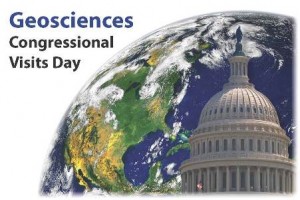October 1, 2014
Nobody Lobbies for Geosciences Like Geoscientists
Posted by cbunge
Written by Margaret L. Fraiser – University of Wisconsin-Milwaukee
I confess that, if I had my druthers, I would spend my days solely ‘sciencing’—conducting fieldwork in remote places, examining samples in the laboratory, and interpreting data with my graduate students. After participating in Geosciences Congressional Visits Day in Washington, DC earlier this month, I have been jarred from this idyll. I am now convinced that geosciences advocacy should be added to my list of regular duties. Here’s why I think you should add it to yours, too:
Since 2004, federal funding for R&D has remained flat until it began dwindling in 2011. The Frontiers in Innovation, Research, Science, and Technology (FIRST) Act of 2014 potentially worsens this funding situation for geosciences researchers. This bill dictates specific dollar amounts to be allocated to each of NSF’s directorates. For the first time in nearly two decades, Congress will authorize what scientific research can be funded. Moreover, Geosciences is the only NSF STEM Directorate slated for a decrease in federal funding. 
This presents a conundrum for geoscientists. Federal agencies support 60% of research performed at universities, but many of us are disinclined to engage in science policy in an effort to preserve science’s objectivity and impartiality. Yet, the boundary between science and policy is getting blurrier; for example, The Chronicle of Higher Education has a recent post about several politicians turned college presidents. The 2014 FIRST Act has heaved geoscientists into the policy realm, effectively putting us in a position to educate about and defend (i.e., lobby for) our research. The American Geosciences Institute, the Geological Society of America, and AGU have excellent science policy staff members. However, something that a senior professional staffer on the Senate Commerce Subcommittee on Science and Space, said sticks with me: ‘Advocate for yourselves. If you don’t do it, no one will’.
We must convey the significance of geosciences to the public and to policymakers, but it is vital to do so without involving partisan rhetoric or championing specific policies. A recent study indicates that persuasive agendas from scientists lead to the public’s distrust, but that ‘discussing, teaching, and sharing information can show scientists’ trustworthy intentions’. We can gain greater support for geosciences research among the public through public lectures, letters to the editor, and social media. (See this AGU page for other great ideas). We need to inform ourselves of policy processes and offer ourselves as resources to our Senators and Representatives.
The actions of policymakers directly affect geosciences. Just as teaching and service are keystones in the academe, geoscientists’ involvement in science policy is becoming critical for the future of our research. Geoscientists have a lot to offer society, and it is up to us to let society know it.

